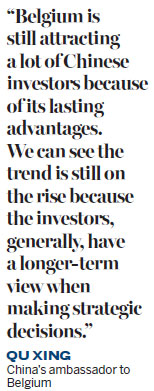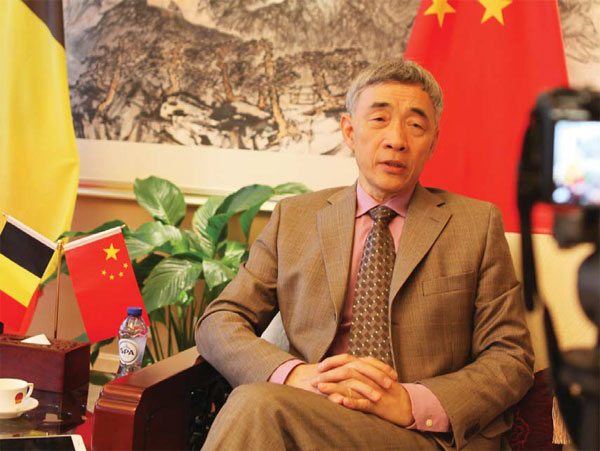Little Belgium packs a big punch
Updated: 2016-10-28 07:27
By Fu Jing in Brussels(China Daily Europe)
|
|||||||||
Chinese ambassador lauds 45 years of diplomatic relations, and highlights business investment in small European nation
The word "but" is probably the one most frequently on the lips of Qu Xing , China's ambassador to Belgium, when describing the achievements of this small country in Western Europe.
Qu, who took up his diplomatic role in late 2014, has been impressed with the strengths of Belgium, a country with only half the population of Beijing.
"It is a small country, but it has tremendous global influence," Qu says.
|
Ambassador Qu Xing says Belgium is not big, but it has tremendous global influence. Fu Jing / China Daily |
Sitting in the guest room of the newly-refurnished Chinese embassy, on an avenue lined with dense trees on the outskirts of Brussels, Qu notes that the country is home to the European Union headquarters, NATO, think tanks and major media, along with lobbying and commercial organizations by the thousands. Behind him hang the flags of China and Belgium, typical of an embassy setting.
"After Washington, Brussels should be the second symbol when we talk about the West," Qu says, referring to the wealth of soft power that makes Belgium different from other European countries.

After setting the scene, Qu, a professor-turned-ambassador, goes into detail about Belgium's advantages in the fields of research and development, foreign trade, education and logistics. The list would be impressive, even for a large nation.
Because China has been in the process of restructuring its economy and boosting outward investment, Qu has been busy exploring cooperative opportunities for Chinese and Belgian businesses, putting as many on-site visits as possible on his daily agenda. Neatly dressed in a grey suit, he has just returned from a visit to the headquarters of Agfa, a leader in color printing and healthcare solutions, located half an hour from Brussels.
"I was impressed by its cutting-edge research capacity," he says.
Agfa is among the global top three in color printing, along with Kodak in the United States and Fuji in Japan.
He has also visited companies in fields such as pharmacy, civilian nuclear technology and the microelectronics sector. He's been impressed at every turn.
Belgium is not a big market - "but", he emphasizes, "it has a strong hold on research and development".
By using the country's geographic location in the heart of the European Union as a gateway, Belgians are inclined to develop international trade and explore markets that value the country's competitiveness in research. In addition, Belgium boasts convenient transportation hubs that can easily connect with Paris, Luxembourg, Amsterdam, Frankfurt and other European cities by water, land or air.
Qu notes that Belgium has several universities in the world's top 200.
All of these factors contribute to its vitality in trade and investment.
Qu has spent a lot of time in Europe. He lived in Paris from 1986 to 1992 while earning a master's degree and a doctorate in political science at the Paris Institute of Political Studies. Between 2006 and 2009, he worked as minister, deputy chief of mission, at the Chinese embassy in France.
Qu says Belgium, which is nestled between the powers of France, Germany, UK and the Netherlands and is a convergence point for Latin and Germanic cultures, "is genetically inclusive, tolerant and open".
It was also among the earliest countries to become industrialized.
Qu says he now has the great responsibility of helping to deepen the bilateral relationship between Belgium and China in several areas.
A renowned professor who was assistant president and vice-president at China Foreign Affairs University from 1995 to 2006 and president of the China Institute of International Studies from 2009 to 2014, he is adept at listing data and forming new narratives in describing the bilateral relationship.
He says businesspeople in China and Belgium today handle trade flows every seven hours equal to an entire year of trade 45 years ago, when the two nations forged diplomatic ties.
The fact is, among the many factors cited by Qu that illustrate the closeness of the partnership the nations have forged over the past few years, bilateral trade may be the most impressive. In 2015 it reached $23.2 billion.
"That's 1,150 times the trading volume at the beginning of our diplomatic relations," he says proudly, adding that the annual growth rate over the past five years has been 16 percent.
He says companies from both nations are more interactive than ever and are investing in each other's enterprises.
For example, Volvo's Ghent plant has been booming since China's Geely took over, Qu says. Every minute the 5,300 local employees produce one automobile, a production rate that yielded a record high 250,000 automobiles annually. With such high performance, the company has fared well in a relatively sluggish global automobile market.
Since October 1971, when the two nations established diplomatic ties, the partnership has made big strides, he added.
"One of the indicators of our close relationship is the high frequency of high-level exchanges," Qu says.
In 2014 and 2015, the heads of state of Belgium and China exchanged visits, promising to deepen the comprehensive friendly and cooperative partnership. Last year, Premier Li Keqiang visited Belgium and, together with Prime Minister Charles Michel, witnessed the signing of 12 cooperation agreements worth more than $20 billion.
This year, the two countries will hold a series of events to celebrate the 45th anniversary of their diplomatic relations. The Chinese New Year parade in Brussels was the first.

The China and Belgium Cooperation Forum on the Belt and Road Initiative was jointly hosted in Brussels on Oct 21.
Terrorism's impact
In March, Brussels was attacked by terrorists who set off explosions at the airport and in subway stations after the earlier attacks in Paris.
Qu says the incidents have had a "negative" impact on tourism in Belgium, with some agencies and individuals canceling their plans. The number of tourists has been decreasing overall because of safety concerns.
"But," Qu says, "Belgium is still attracting a lot of Chinese investors because of its lasting advantages."
"We can see the trend is still on the rise because the investors, generally, have a longer-term view when making strategic decisions," he says.
He notes that, in fast-changing surroundings, it is hard to predict the danger of a terrorist attack, and every country should bear the brunt of such risk.
"But," he says, "continuing with normal life in society is another way to fight terrorism."
"It is not Belgium alone," he says. "In this sense, terrorism attacks will not discourage investors."
Yao Yueyang contributed to the story.
fujing@chinadaily.com.cn
(China Daily European Weekly 10/28/2016 page15)
Today's Top News
Strongest quake in decades hits central Italy
EU, Canada sign landmark deals
Party ramps up supervision
Queen Elizabeth visits new town Poundbury
UK retailers catering for homesick Chinese
UK government opts for new Heathrow runway
China's business leaders optimistic about UK
Workers tear down Calais 'Jungle'
Hot Topics
Lunar probe , China growth forecasts, Emission rules get tougher, China seen through 'colored lens', International board,
Editor's Picks

|

|

|

|

|

|








